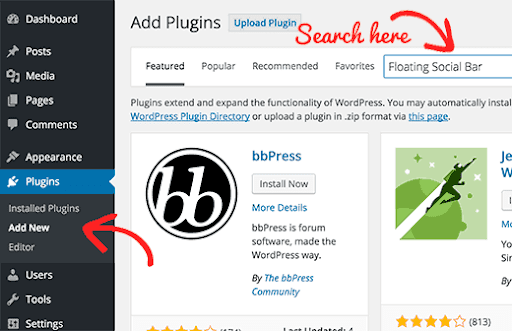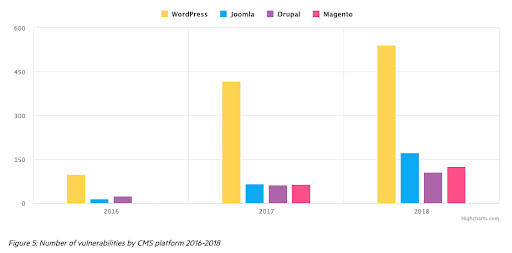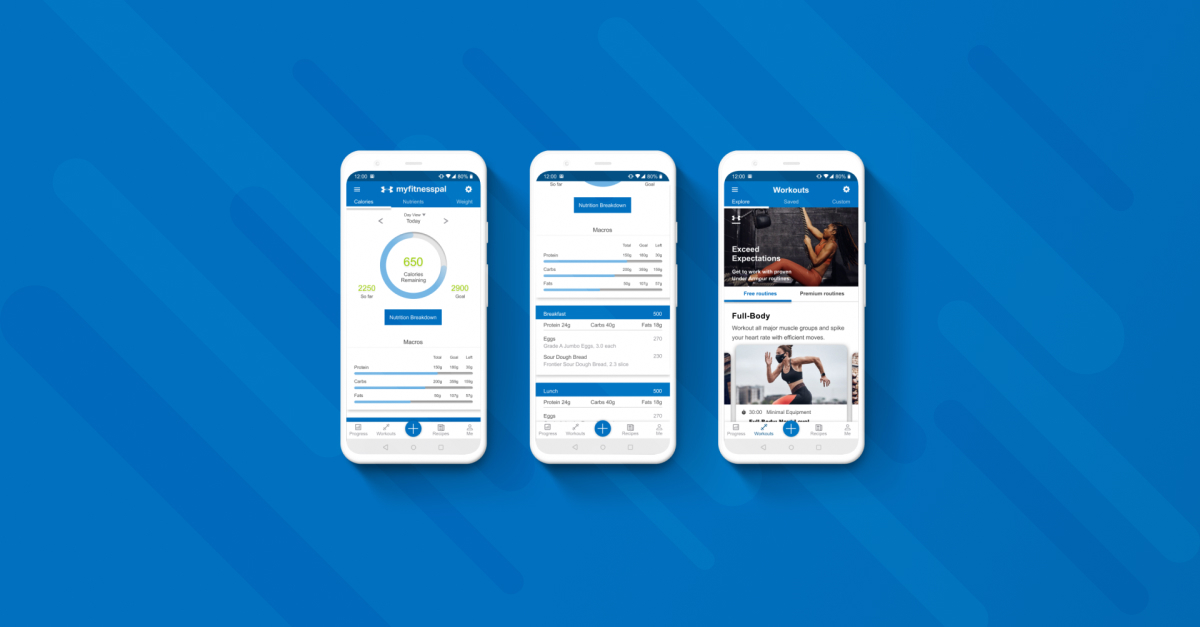In this blog, I will be discussing what are the advantages and disadvantages of WordPress websites to give you an idea about how effective it can be for your business.
According to W3Techs, WordPress powers over 1/3rd of the top 10 million websites on the web. Over the last few years, the market share has been rising steadily, reaching 33.4% from 29.9%.
In its early years, WordPress was just a blogging platform. But, now it is the largest and one of the most popular content management systems (CMS) in the market. It has now been established as a CMS leader in the industry.
8 More WordPress Plugins & How To Use Them – A Step by Step Guide
When it comes to selecting the best platform to build your website with, WordPress is the name that always pops up. This open-source platform is the first choice of many bloggers for creating interactive websites. WordPress does have tough competition though, especially with the increasing popularity of Joomla and Drupal.
Here, in this blog, I’m going to highlight the advantages and disadvantages of WordPress to help you make the right decision.
Let’s first talk about the advantages of WordPress.
Advantages of WordPress
Advantages of WordPress: User-Friendly CMS
Using a CMS like WordPress allows the site’s admin to edit pages, navigate through the back-end of the website, and upload the new content.
Without any technical knowledge like website management and coding skills, the website owners or bloggers can edit & maintain their sites using easy-to-use features like drag and drop.
Advantages of WordPress: Plugins
One of the major advantages of WordPress is that it has over 45,000 plugins for almost every functionality. No matter whether you want to enhance the SEO or run an analysis of your site, you can find specific plugins for everything.
This means you don’t have to write lines of code for every functionality you want on your site. You just need to install the plugin and enjoy that functionality in your site.
Read more: 5 Best SEO Plugins for WordPress
Advantages of WordPress: SEO-Friendly
The plugins on WordPress are designed for SEO purposes and simplicity. Some people have a hard time with Meta descriptions and tags. WordPress helps in making these tags easy to use and understand.
Not just this, when it comes to optimization, WordPress is also an excellent teacher. WordPress helps you to identify the most used phrases & words in your blog that can be used as keywords to make your page/blog more SEO-friendly. This way, more people will be able to find your content, while benefiting from it.
Advantages of WordPress: Responsive Websites
With increasing usage of mobile devices for internet surfing, having a mobile-friendly site is crucial to the UX as well as SEO. When it comes to being responsive, most of WordPress’s themes and designs are responsive. By using WordPress as your website’s CMS, you’ll be able to benefit from a responsive site for your business without having to create a separate website altogether.
Advantages of WordPress: Open-Source Community
One of the prime benefits is that WordPress is an open-source platform. It means the developer can use, change, and study the code without having to create it from scratch.
Being open-source software, WordPress programmers can share the code online with other developers too. This helps in saving a lot of time and cost of writing & implementing a new codebase for minor or major changes.
Moreover, many of the plugins and themes are free under the GPLv2 license. This means you can easily modify and use the code without having to pay any license or subscription fees.
After scrolling through the advantages of WordPress, let’s just check out why WordPress isn’t always the best fit.
8 More WordPress Plugins & How To Use Them – A Step by Step Guide
Disadvantages of WordPress
Disadvantages of WordPress: Customization
Unlike other drag and drop web builder tools out there, WordPress is quite a flexible tool. However, if you’re not an expert of WordPress or if you don’t have a skilled WordPress developer for it, you might face some serious issues.
Problems such as updating core WordPress can be troublesome as updating can break some of the functionality. Also, if you are not well-versed with the practices used for designing the site, it can become a problem too.
Disadvantages of WordPress: Vulnerability & Data Security
One of the major disadvantages of this CMS is that it can be vulnerable in multiple cases. Since WordPress is an open-source platform, it opens the room to potential hackers.
In order to mitigate this risk, choosing the right themes and plugins for your WordPress websites is crucial. Also, it is always good to assess the quality of a WordPress plugin before installing it.
As per the research, WordPress has been registered as the one with the highest number of vulnerabilities with 542 in 2018, which is a 30% increase from 2017.
Read more: Over 2000 WordPress Sites Hit by Malicious Redirects
Disadvantages of WordPress: Frequent Updates
Installing WordPress is not enough. In order to make sure that it works properly, you have to install several plugins and themes. The more plugins you use, the more you’re going to encounter compatibility challenges.
Besides, updating your site frequently might also hinder its functionality like plugins might stop working. Before updating your website, make sure you have a backup of your data.
8 More WordPress Plugins & How To Use Them – A Step by Step Guide
Advantages and Disadvantages of WordPress: Conclusion
In this blog, we have discussed WordPress’s advantages and disadvantages to give you a brief idea about its features. By reading the above pros and cons of using WordPress, you must be ready to make the right decision now! Do you wish to get an interactive and user-friendly website designed? If YES, then all you need is a skilled WordPress developer.
Another reputed programming language for eCommerce development is Magento. This is primarily an eCommerce platform that is built on an open-source technology enabling merchants with flexible shopping cart systems.
Magento also facilitates controls over the look, functionality, and content of the online business. Top Magento Developers are quickly attracting stores from across the globe because of its user-friendly back-end UI, flexible architecture, and simplified checkout process.
Good Luck!
General FAQ
What are the Advantages of WordPress?
2. It has over 45,000 plugins for almost every functionality.
3. WordPress helps you to identify the most used phrases & words in your blog that can be used as keywords to make your page/blog more SEO-friendly.
4. Most of WordPress themes and designs are responsive!
5. WordPress is an open-source platform. It means the developer can use, change, and study the code without having to create it from scratch.
What are the Disadvantages of WordPress?
2. In order to make sure that it works properly, you have to install several plugins and themes. Updating your site frequently might also hinder its functionality.
Is WordPress still popular 2020-2021?
Yes. WordPress is the most used CMS from all over the world. It powers 39.6% of the internet in 2021 – a growth of 4% from 2019 and a 5% rise from 2020!










































